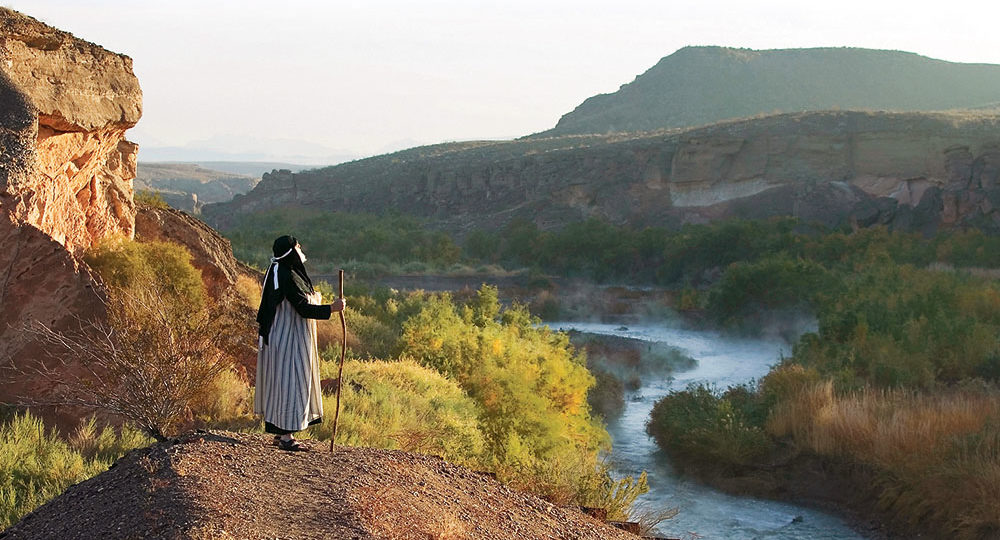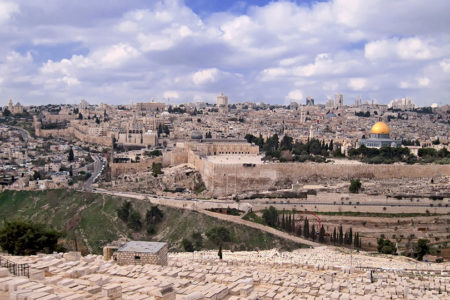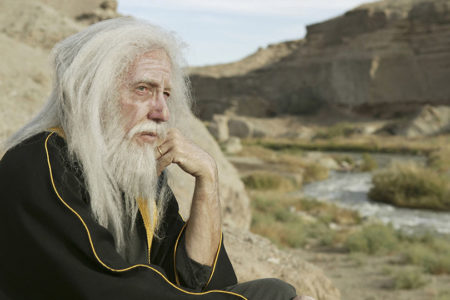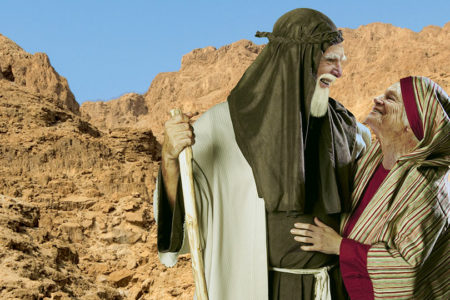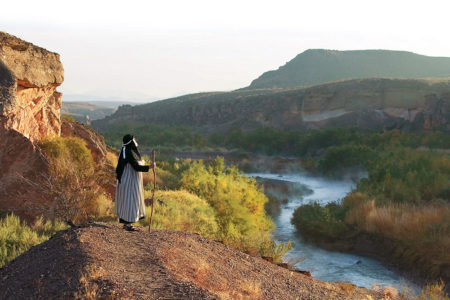The Far-Reaching Abrahamic Covenant
Imagine, if you can, an “appearance” by the God of glory to an idol worshiper named Abram living in Mesopotamia. He gave Abram a command and an extraordinary promise, commonly referred to as the Abrahamic Covenant:
Now the Lᴏʀᴅ had said to Abram: “Get out of your country, from your family and from your father’s house, to a land that I will show you. I will make you a great nation; I will bless you and make your name great; and you shall be a blessing. I will bless those who bless you, and I will curse him who curses you; and in you all the families of the earth shall be blessed” (Gen. 12:1–3).
Fundamental
The Abrahamic Covenant is fundamental to understanding God’s revelation to mankind. Genesis consists of two main sections. According to God’s “calendar,”1 chapters 1 through 11 cover approximately 2,000 years. Genesis 12 through 50 focus on the patriarchs: Abraham, Isaac, Jacob, and Joseph. The Old Testament story of Israel concludes with the book of Malachi in approximately 400 BC.
Therefore, Old Testament history is divided into two 2,000-year periods: (1) creation to Abraham and (2) Abraham to the birth of Jesus.
During the first 2,000 years, God deals with the entire human race in broad brushstrokes (and sketchy details), as seen in the list of godly men in Genesis 5.
During the second 2,000 years, God deals primarily with the family of Abraham, Isaac, and Jacob. The rest of the nations (Hebrew, goyim) are included only as they intersect and interact with God’s Chosen People.
God’s relationship with Abraham is fundamental, then, to a proper understanding of the bulk of the Hebrew Scriptures (38 and one half books). Major themes like election, grace, faith, accountability, and judgment are all presented, expounded on, and/or clarified, as one comprehends the origin, scope, and design of this completely unsolicited covenant with Abraham.
God’s redemption of Israel from Egypt, His expectation of Israel’s holiness, and His blessings and chastenings are all rooted in this initial covenant.
This covenant establishes Israel’s centrality in God’s redemptive and eschatological programs, extending beyond the pages of the Old Testament. The universality of the future ministry of Israel’s Messiah is also clearly rooted in this promise from God to His chosen subject.
Indeed, all of God’s subsequent relationships with humanity would be governed by the Abrahamic Covenant.
Foundational
It follows then, that this covenant is foundational to understanding God’s relationship with Israel. It provides the groundwork for the various aspects of God’s program for His people, beginning with God blessing Abraham and concluding with the Messiah’s redeeming and ruling work.
The three major components of the covenant—land, seed, and blessing—embody the heart and soul of what God proposes to do through the selection of this people for Himself.
Land. The promise of the land (“to a land that I will show you”) is repeated and expanded numerous times in the Hebrew Scriptures, beginning in Genesis 13:14–17:
And the Lᴏʀᴅ said to Abram, after Lot had separated from him: “Lift your eyes now and look from the place where you are—northward, southward, eastward, and westward; for all the land which you see I give to you and your descendants forever. And I will make your descendants as the dust of the earth; so that if a man could number the dust of the earth, then your descendants also could be numbered. Arise, walk in the land through its length and its width, for I give it to you.”
This chapter provides the first major expansion of the original covenant. God’s reiteration of the land promise makes it exceedingly clear that He gave the land to Abraham and his descendants forever.
Later, when Abraham asked for reassurance after he refused to claim the conquered land for himself in Genesis 15:8, God responded by amplifying the land promise, which goes from Isaac to Jacob to Jacob’s descendants. (See also Genesis 17:8; 26:2–3; 28:13–15; 35:9–15.)
Ultimately, the promise is elaborated on for the nation through the blessings and curses of Moses in Deuteronomy 28—29, who intended “that you may live and multiply; and the Lᴏʀᴅ your God will bless you in the land which you go to possess” (30:16). The rest of the Old Testament records God’s dealing with Israel in light of these blessings and curses.
Seed. The promise of “seed” (descendants) is the second component of the Abrahamic Covenant. God told Abraham “I will make you a great nation” when Abraham was 75 and childless. When He reiterated the covenant after Abraham gave Lot the land Lot wanted, God promised to “make your descendants as the dust of the earth; so that if a man could number the dust of the earth, then your descendants also could be numbered” (Gen 13:16).
Close to 80 and still childless, Abraham told God, “Look, You have given me no offspring; indeed one born in my house is my heir!” (15:3).
God replied, “[Eliezer] shall not be your heir, but one who will come from your own body shall be your heir” (v. 4). Then God brought Abraham outside and said,
“Look now toward heaven, and count the stars if you are able to number them.” And He said to him, “So shall your descendants be.” And he [Abraham] believed in the Lᴏʀᴅ, and He accounted it to him for righteousness (vv. 5–6).
When Abraham and Sarah tried through Sarah’s handmaid Hagar to fulfill God’s promise for a son, God allowed them to live with the consequences for 13 years. Then He clarified that, though Hagar and Abraham’s son, Ishmael, would be blessed, the promised seed was to come through Sarah, who would produce a son named Isaac: “But My covenant I will establish with Isaac, whom Sarah shall bear to you at this set time next year” (17:21). Isaac would also learn that the womb was opened and closed by God.
Ultimately, the seed promise is extended through the Davidic Covenant when King David is promised that one of his descendants will sit on the throne of Israel forever:
When your days are fulfilled and you rest with your fathers, I will set up your seed after you, who will come from your body, and I will establish his kingdom. He shall build a house for My name, and I will establish the throne of his kingdom forever. I will be his Father, and he shall be My son. If he commits iniquity, I will chasten him with the rod of men and with the blows of the sons of men. But My mercy shall not depart from him, as I took it from Saul, whom I removed from before you. And your house and your kingdom shall be established forever before you. Your throne shall be established forever (2 Sam. 7:12–16).
Blessing. The promise of blessing is the third component of the Abrahamic Covenant. God told Abraham, “I will bless you and make your name great; and you shall be a blessing. I will bless those who bless you, and I will curse him who curses you; and in you all the families of the earth shall be blessed” (Gen. 12:2–3).
The blessing is material to be sure, as indicated by God’s generous treatment of Abraham, Isaac, and Jacob, even when they were disobedient. But the spiritual nature of the blessing is indicated by the extent of the promise. God wanted to bless Abraham and his descendants through their obedience to Him and also bless the rest of mankind through them.
His plan was to grant them redemption, draw them to Himself in holiness, and (through them) lead the nations of the earth into knowledge of Him. Their blessing would make them a light to the nations. To that end, God worked to develop His relationship with Abraham, Isaac, Jacob, and Jacob’s descendants. They were to reflect the glory of the Most High God to the nations around them.
An amplified form of the blessing came with the Mosaic Covenant, instituted at Mount Sinai. In Exodus 19, God told Moses,
Thus you shall say to the house of Jacob, and tell the children of Israel: “You have seen what I did to the Egyptians, and how I bore you on eagles’ wings and brought you to Myself. Now therefore, if you will indeed obey My voice and keep My covenant, then you shall be a special treasure to Me above all people; for all the earth is Mine. And you shall be to Me a kingdom of priests and a holy nation.” These are the words which you shall speak to the children of Israel (vv. 3–6).
The Mosaic Covenant was intended as the vehicle through which the Jewish people would experience the riches of God’s blessing. Never intended to be the means of their salvation, it was designed to be the guide for their stewardship as children and subjects of the Most High God, so that He might bless them.
Psalms 1 and 19, for example, extol the blessings of keeping the Law. The godly couple Zacharias and Elizabeth (Lk. 1:6) are examples of what God expected. Instead, the Israelites stumbled over the Law, either rejecting it and living according to their own desires, or attempting to use it to produce their own righteousness (cf. Rom. 9:30–33).
The prophet Jeremiah announced that this covenant would be replaced by a new one that would produce the blessing because it would be written on the hearts of God’s people, rather than on stone tablets (Jer. 31:31–34). God then promised that Israel will always be a nation before Him (vv. 35–37).
Graciously, the Messiah instituted this New Covenant by His death (Mt. 26:28); and it will be the basis of God’s blessing of Israel (and the nations) forever.
Forever
In addition to being fundamental to God’s revelation and foundational to God’s program of history, the Abrahamic Covenant is forever. Its unconditional nature argues that it is eternally binding.
Abraham neither sought the covenant nor had an active role in ratifying it. God instituted His covenant with an unsuspecting, pagan idol-worshiper from Mesopotamia, as a work of His grace alone. Genesis 15:6 states that Abraham was declared righteous when He believed God would fulfill His promises.
God states numerous times that the features of this covenant are eternal:
- Israel is promised the land forever (13:15).
- David is promised a son on his throne forever (2 Sam. 7:16).
- God promises the blessings of the New Covenant forever (Jer. 31:35–37).
Even after the fall of the southern, Davidic kingdom of Judah, God promised the prophet Daniel, “The saints of the Most High shall receive the kingdom, and possess the kingdom forever, even forever and ever” (Dan. 7:18). Israel (as a nation) has not yet entered into the fullness of these promises.
The day will come when, in conjunction with its reception of the New Covenant that has been provided by its Messiah, Israel will begin to experience the abundant provisions of the Abrahamic Covenant. The apostle Paul wrote,
For I do not desire, brethren, that you should be ignorant of this mystery, lest you should be wise in your own opinion, that blindness in part has happened to Israel until the fullness of the Gentiles has come in. And so all Israel will be saved, as it is written: “The Deliverer will come out of Zion, and He will turn away ungodliness from Jacob; for this is My covenant with them, when I take away their sins.” Concerning the gospel they are enemies for your sake, but concerning the election they are beloved for the sake of the fathers. For the gifts and the calling of God are irrevocable (Rom. 11:25–29).
Until that day, individual Jewish people can accept God’s provision of those blessings through the church, which the Messiah is building. They can become part of the remnant to which Paul referred in Romans 11:1–10 and share in those provisions with the Gentiles, whom God had planned to include all along (9:24–29).
Meanwhile, it behooves Gentile believers to maintain a humble gratitude to God and to the Jewish people. Paul cautioned us,
And if some of the branches were broken off, and you, being a wild olive tree, were grafted in among them, and with them became a partaker of the root and fatness of the olive tree, do not boast against the branches. But if you do boast, remember that you do not support the root, but the root supports you (11:17–18).
ENDNOTE
- Adding the numbers in Genesis 5 and 11 reveals Abraham was born approximately 1,948 years after creation and entered Canaan at age 75, approximately 2,023 years after creation. Comparing these numbers with the rest of the Old Testament dates creation at approximately 4000 BC.
